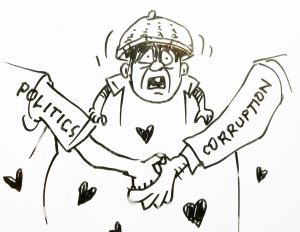Corruption and the excessive influence of politics are two interconnected phenomena that pose significant challenges to the functioning and development of societies worldwide. While politics plays a vital role in advancing the interests of citizens, it becomes problematic when it devolves into corruption, jeopardizing the very principles that underpin democratic governance.
Politicians are entrusted with the responsibility of representing the interests of their constituents and shaping public policies for the betterment of society. However, the concentration of power often provides opportunities for corruption to take root. Corruption, broadly defined as the abuse of entrusted power for personal gain, encompasses various forms, including bribery, embezzlement, favoritism, and nepotism. The allure of financial gain or higher social status can tempt politicians to engage in corrupt practices, undermining the spirit of fair and just governance. Furthermore, political actors, driven by the desire for re-election or party loyalty, might prioritize personal or partisan interests over the welfare of citizens, perpetuating corruption and negating the principles of democratic representation.
The excessive influence of politics, particularly when accompanied by corruption, hampers socioeconomic progress and erodes public trust. Diverting resources from critical sectors such as healthcare, education, or infrastructure to line the pockets of corrupt officials, weakens social systems and perpetuates societal imbalances. Moreover, when politicians prioritize their self-interest over socio-economic development, effective policies might be compromised or undermined altogether. As corruption scandals continue to emerge, the public’s trust in political institutions is severely eroded, leading to disillusionment, voter apathy, and a decline in political participation. Ultimately, this vicious cycle perpetuates the dominance of corrupt politicians, impeding social progress, and exacerbating inequality.
Addressing corruption and reducing the excessive influence of politics necessitates comprehensive solutions that encompass legal, institutional, and societal dimensions. Strengthening legal frameworks, promoting transparency, and enforcing accountability are crucial steps towards combating corruption. Additionally, bolstering independent oversight institutions, such as anti-corruption agencies and auditing bodies, aids in exposing and preventing corrupt practices. Promoting public awareness, education, and a culture of integrity can also foster a more ethical political environment. Furthermore, building robust political parties and campaigns solely based on merit, ideas, and policies can help reduce the influence of money and patronage in politics, improving the quality of governance and limiting the potential for corruption.




